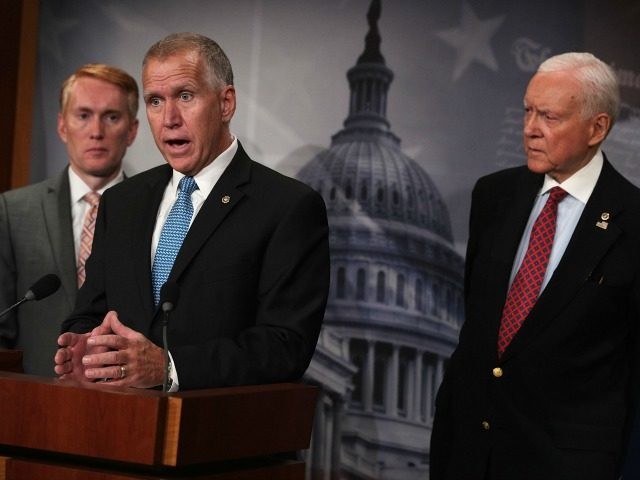Two pro-amnesty GOP Senators are admitting that their politically risky offer of a huge slow-paced amnesty is not generous enough to satisfy a Democratic group’s demand for a bigger and faster amnesty.
The January 4 afternoon statement from amnesty-boosters Sen. Thom Tillis and Sen. James Lankford said:
Over the course of the last several weeks, we have negotiated in good faith with Senate Democrats on a DACA agreement. Unfortunately, our discussions on border security and enforcement with Democrats are much further apart, and that is key to getting a bipartisan deal on DACA. Until that happens, we cannot accomplish the solutions our country needs and many families deserve. More work remains ahead.
On Thursday, at 7:35 PM, the McClatchy news service reported that Tillis had been pushed out from the group which is trying to develop the amnesty. The bipartisan group is led by GOP Sens. Lindsey Graham and Cory Gardner, and by Democratic Sens. Richard Durbin and Michael Bennett. According to McClatchy:
Sen. Thom Tillis, a North Carolina Republican who has sought to make immigration one of his signature issues, is no longer involved in key bipartisan Senate negotiations over how to protect hundreds of thousands of immigrants who will soon lose their renewable work permits …
The senators “would very much like to see Tillis as part of the negotiation, but question his fortitude to take on what he may perceive as a tough issue,” the third person said.
Tillis spokesman Daniel Keylin said the senator has not left the group and did not respond to questions about staff. “Tillis never left the working group, and we have recently attempted to engage with Senate Democrats to continue discussions,” he said. “Unfortunately we have not heard back.”
The split came because Tillis recognized that Democrats refused to concede anything to President Donald Trump’s popular demand for border upgrades, the border wall, plus ending chain migration and the visa-lottery.
The split will make it more difficult for a remaining group of pro-amnesty GOP and Democratic Senators to unite and to persuade Trump to accept their pending amnesty plan, which offers many benefits to business groups, the Democratic Party, and illegal immigrants, but few benefits to Americans.
Trump’s immigration priorities, in contrast, are popular and likely to help him win the 2018 midterm elections.
The Tillis/Lankford amnesty is dubbed the SUCCEED Act, and it would offer a 15-year path to the voting booth to roughly 2 million illegals, plus their chain-migration relatives. More importantly, the amnesty would also deep-six President Donald Trump’s “Hire American” policies by proving business can prod Congress to import more cheap-labor whenever wages are rising. Tillis’ amnesty was also backed by retiring Sen. Orrin Hatch, another long-standing advocate for H-1B outsourcing.
But Democrats are rejecting the Tillis/Lankford amnesty, and instead pushing their own DREAM Act, which offers a five-year fast-track to the voting booth for at least 3.25 million illegals, plus millions of their chain-migration relatives. On January 4, for example, House Democratic Caucus Chairman Representative Joe Crowley, revived the Democrats’ December demand for a no-strings DREAM Act amnesty. He said:
Unless the president, who has promised to address this issue, works to make that happen in a clean bill, that’s what Democrats are looking for. A $40 billion wall is a waste of government money. … You can’t drive on it. You can’t live in it. You can’t do anything with it, and it really is just a waste of government resources. We [already] have the security along our border that we need.
The DREAM Act will cost taxpayers $26 billion during the first ten years, according to a low-ball estimate by the Congressional Budget Office. The CBO has not put a price tag on the Tillis/Lankford bill.
Even as they revive the DACA demands, Democrats are also shifting away from the unpopular DACA fight to pose as champions of the middle-class in the run-up to the 2018 election. For example, Sen. Chuck Schumer told reporters on Thursday that the Democrats were concerned about GOP spending priorities as he also downplayed the Democrats’ continued call for an amnesty.
Tillis shed some light on the breakdown in a Thursday interview with the 1@ radio program. He suggested that the negotiators made progress when arguing over the scale of the amnesty and the number of years illegals would take to become citizens, but differed on the border upgrades and reforms sought by Trump.
Yet Tillis’s amnesty priorities also distanced him from his own voters, who strongly prefer immigration rules which aid fellow Americans rather than immigrants or business CEOs. For example, Tillis said that he thinks business should be allowed to hire more immigrant workers. He told 1@:
I, for one, do not necessarily think that we need fewer immigrants, We may need more legal immigrants to fulfill jobs, to provide for diversity, any number of things.
The failure of Tillis and Lankford to bridge the ideological gap with the Democrats reflects the risks facing the GOP’s pro-amnesty advocates, such as the “Gang of 33” House members who urged passage of a Christmas amnesty.
Their December 5 letter was exploited and exaggerated by cheap-labor business groups and also slammed by pro-American voters, leaving the 33 GOP legislators with angry constituents. The pain was felt most by Virginia Rep. Scott Taylor, who now faces an energized primary rival.

COMMENTS
Please let us know if you're having issues with commenting.